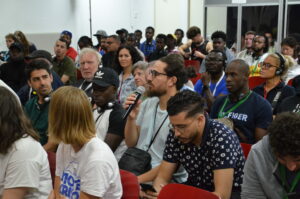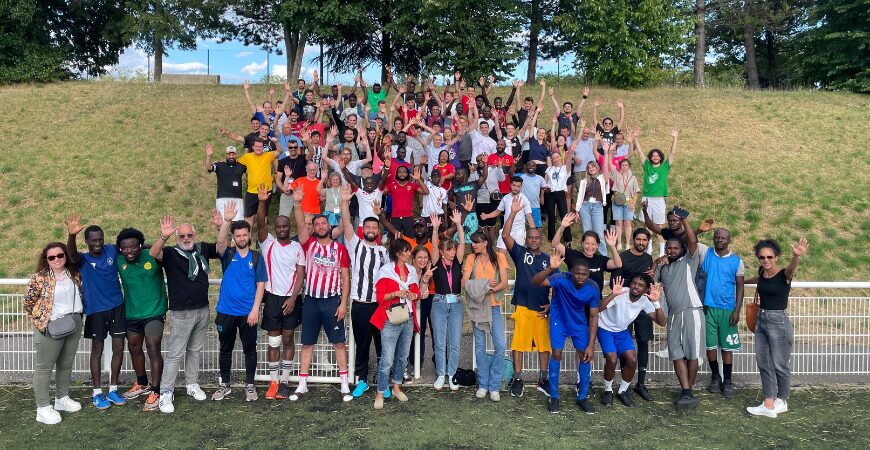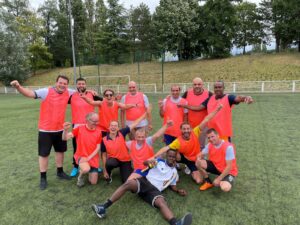Scoring Goals for Peace and Human Rights: 2nd edition!
Sport reveals its unique ability to bring people together across linguistic and cultural boundaries. On the football pitches of Dijon on 22 and 23 July, 128 European participants transformed cultural differences into collective assets.
128 participants, 80% of whom were companions, from 21 Emmaus groups in nine European countries… The second edition of the Emmaus Europe Football Cup for Peace and Human Rights was every bit the celebration it promised to be, thanks in particular to the Emmaus Dijon-Norges community, co-organisers of the event, and especially to Virginie! Beyond the statistics, it is the content of the workshops, the moments on the pitch and the encounters that deserve to be highlighted.
The challenge of a multicultural and multilingual gathering
How can we ensure that as many participants as possible feel completely at ease? How can we welcome them and provide opportunities for them to meet one another, while also addressing complex themes during workshops and plenary sessions?
On top of that, there’s the language issue, where the movement’s three official languages collide with the reality on the ground: how can we engage Ukrainian, Romanian, Portuguese and German companions who don’t speak French, English or Spanish?
The language of football
The answer was simple: bring everyone together through sport! ‘During the matches, a lot happens: language barriers come down, and we were able to communicate very well with the Ukrainians and Bosnians on the pitch!’ recalls Sylvère, community leader in Étang-sur-Arroux (France).
For some participants, such as the companions from the Caminho e Vida group (Porto, Portugal), this was their first international meeting with other Emmaus communities. They still have vivid memories of the discussions in the plenary sessions and workshops, which were interpreted into Spanish. They were particularly moved by the respect and ‘pacifism’ that reigned on the football pitches.
‘It is very important to meet people from other communities, to mix with fellow companions and leaders. We learned a lot about the topics discussed, thanks to the interpreters’ says Nelson, a companion in Porto.
What topics were discussed?
 On the first day, the fight against fake news took centre stage, thanks to workshops led by our colleagues from Emmaüs Connect and a general presentation by Victor Baysang-Michelin in plenary session. Participants had the opportunity to try their hand at editorial cartooning and information analysis during two workshops led by Cami, an editorial cartoonist.
On the first day, the fight against fake news took centre stage, thanks to workshops led by our colleagues from Emmaüs Connect and a general presentation by Victor Baysang-Michelin in plenary session. Participants had the opportunity to try their hand at editorial cartooning and information analysis during two workshops led by Cami, an editorial cartoonist.
‘I didn’t know fake news existed’ says Aboubakar, a companion at Emmaus Étang-sur-Arroux. ‘The workshops taught me how to spot it and be more careful on social media.’
On the second day, we explored the mechanisms of violence, with a focus on community life helped by the work of IFMAN: what is violent, how can we escape violence, how can we break out of conflict situations and turn towards non-violence?
Ismail, companion at Emmaus Niort-Prahecq: ‘The discussions taught me a lot. Once I returned to the community, I discussed it with my manager. I learned that there are ways to avoid conflict by working together, despite our different temperaments. (…) I understand more things now, how the community works, which isn’t necessarily how you would prefer it to be… The workshops helped me understand that nothing can be solved through violence!’
A chance to meet people from all over the world and share experiences
Louis-Marie, who has been volunteering at Emmaus Niort-Prahecq for over 15 years, accompanied Hossein and Ismaël to the event. ‘The event gave us an opportunity to discuss our different cultures, family, the role of the father, peace, tolerance… The theme of non-violence allowed us to talk about all these subjects. We also discussed issues related to racism during the Emmaus International workshop.’ The two workshops, led by Nathalie Jobert, Training Officer at Emmaus International, gave the companions the opportunity to talk about their life experiences and provided them with tools for resolving conflicts within groups.
‘It felt good to be mixed together, to have no barriers between “those receiving help” and “those providing help”!’ recalls Iseult, from Emmaus Connect. She hopes to replicate this approach at the Paris branch, which she is set to join in September.
‘Football plays a key role; we put our bodies first, and the informative content is secondary: it’s not just an intellectual encounter, and that feels good. The atmosphere on the football pitches was incredible, very festive,’ she concludes. ‘We’re lucky to be able to do this job and experience this kind of thing. Ultimately, encounters like this give meaning to your life!’
Towards the third edition: return to Srebrenica (Bosnia and Herzegovina) in 2027!
The participants’ enthusiasm remains undiminished. Discussions have already given rise to ideas for enhancing the next edition of the Emmaus Europe Football Cup.
Two themes have emerged from the group discussions for 2027. Mental health is a growing concern within communities. Interculturality, meanwhile, has become a key topic following the positive experience of exchanges in Dijon.
After hosting the first edition of the event in 2023, Bosnia and Herzegovina will host the third edition in 2027. This geographical choice promises new linguistic and cultural challenges, while perpetuating the spirit of European solidarity that drives this unique event.
See the photos of the 2025 Emmaus Europe Football Cup for Peace and Human Rights here.





